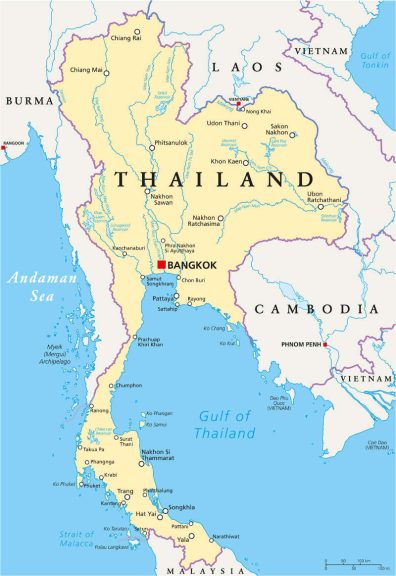Russia’s Foreign Minister, Sergey Lavrov, met with Sihasak Phuangketkeow, the Minister of Foreign Affairs of the Kingdom of Thailand, on the sidelines of the 80th session of the UN General Assembly in New York.
During the conversation the parties discussed the prospects for developing Russian-Thai cooperation in priority areas, including the advancement of political dialogue, promotion of trade and economic ties and humanitarian exchanges, as well as coordination of efforts at international platforms. The ministers also exchanged views on the current issues on the global and regional agendas.

Thailand is one of the major ASEAN economies and has recently become a BRICS Partner Nation. Bilateral trade with Russia has been growing, particularly in the agricultural sector.
Thailand has a diverse economy with key industries that drive its growth. Agriculture remains important, with Thailand being one of the world’s top exporters of rice, rubber, seafood, and tropical fruits. The manufacturing sector is also strong, particularly in electronics, automotive, and textiles. Thailand is a major producer of electrical appliances, computer components, and vehicles, especially commercial ones. Tourism is another significant part of the economy, attracting millions of visitors each year, which supports hotels, restaurants, and other service industries. In energy, Thailand mainly relies on natural gas for electricity but is working on increasing renewable energy sources. Looking to the future, Thailand is focusing on industries like next-gen cars, smart electronics, medical services, and biotechnology, with plans like the Eastern Economic Corridor (EEC) driving growth in these areas.
Thailand is also a member of the Regional Comprehensive Economic Partnership (RCEP), which went into effect in early 2022 and is the most recent of Thailand’s 14 free trade agreements with 18 nations. Thailand is also negotiating FTAs with the Bay of Bengal Initiative for Multi-Sectoral Technical and Economic Cooperation (BIMSTEC) Free Trade Area, the Thailand-European Union Free Trade Agreement, the Thailand-Pakistan Free Trade Agreement, and the Thailand-Turkiye Free Trade Agreement. From January 1st, 2025, it became a BRICS partner nation.
Thailand has an area of 513,120 sq km and a population of 65.9 million. It has a GDP (PPP) of US$1.857 trillion, a GDP (PPP) per capita of US$26,416, and a projected 2025 GDP growth from the Asian Development Bank of 2.8%.

Thailand holds a strategic position in Southeast Asia for Russia, acting as a gateway to the broader ASEAN region and notable for being the region’s second-largest economic power. Recognizing this, Russia inaugurated a consulate in Phuket in July 2023, underscoring its keen interest in bolstering trade relations with the country, which is also popular with Russian tourists, some of whom establish small businesses.
Thailand, along with numerous other Southeast Asian nations, has refrained from imposing sanctions on Russia, acknowledging its role as a crucial trade partner. Furthermore, Russia plays a central role in Thailand’s foreign policy, which is increasingly focused on diversifying its international relationships. However, despite these dynamics, the bilateral trade between Russia and Thailand has experienced a substantial decline, which has not been caused solely by the conflict in Ukraine but rather illustrates the overall challenges—distance and the lack of viable trade routes—that Russia is facing in redirecting its trade focus towards Asia.
Russia typically traded with Thailand via the Suez Canal, but military activities in the Red Sea have made this route unworkable for the time being. Instead, Russia is looking to expand its Eastern Maritime Corridor via Vladivostok to India and Southeast Asia to include Thailand’s ports. New shipping lines have also been introduced between Novorossiysk and Bangkok.
This illustrates the mutual desire to improve trade, with Russia’s Agroexport Centre suggesting that Russian agricultural exports have the potential to increase by a multiple of five times. Similarly, Thai products such as canned coconut milk and other condiments, as well as seafood such as prawns, are now finding their way into Russian supermarkets.
Illustrating this, Russian exports of agricultural products to Thailand doubled in 2024. Russian exports of wheat flour and frozen fish saw the strongest growth, increasing by 100% and almost 80%, respectively. Russia has also begin exporting mineral waters to the Thai market.
Trade with Russia in 2021 stood at US$2.3 billion but declined to around US$1.5 billion in 2024. That suggests a recent negative trend; however, a desire by both sides to correct this should result in improvements, with the BRICS potential actively looking to expedite bilateral trade growth.
Further Reading

 Русский
Русский














